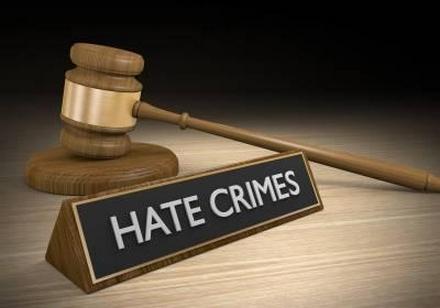TELEPHONES ANSWERED 24 HOURS A DAY
What Defines a Federal Hate Crime?
 Being charged with a hate crime puts you in a very difficult position. If you are accused of committing a crime based on prejudice against the victim, you are likely to be branded a bigot. That image can be difficult to shake, especially since alleged hate crimes are often publicized. On top of a lengthy prison sentence, you could have to deal with permanent social repercussions. Sometimes, people are surprised to learn that they have been charged with a hate crime based on their choice of victim - it can be difficult for prosecutors to discern whether the crime was motivated by hate or by something else.
Being charged with a hate crime puts you in a very difficult position. If you are accused of committing a crime based on prejudice against the victim, you are likely to be branded a bigot. That image can be difficult to shake, especially since alleged hate crimes are often publicized. On top of a lengthy prison sentence, you could have to deal with permanent social repercussions. Sometimes, people are surprised to learn that they have been charged with a hate crime based on their choice of victim - it can be difficult for prosecutors to discern whether the crime was motivated by hate or by something else.
If you have been accused of a hate crime, it is important to tread carefully. Your best bet is to immediately contact a federal crimes lawyer and follow his advice.
When is a Crime Considered a Hate Crime?
Most offenses that involve a victim could potentially be charged as a hate crime. “Hate crime” is not an offense in and of itself - it is a sort of enhancement that is added onto another crime. So, for a hate crime to be charged, there must first be a crime of some type. Assaults and criminal damage to property are common examples. Then, the crime must be motivated by hate towards a particular group of people. The requisite hate can be directed towards the victim based on their:
-
Religion
-
Race, color, or ethnicity
-
Disability, including psychiatric disability
-
National origin
-
Gender or gender identity
-
Sexual orientation
It is important to note that a victim’s status as part of the group the alleged hate is directed towards can be actual or perceived. For example, if the defendant attacked a woman because he believed her to be Muslim, he cannot defend himself by arguing that he was mistaken and the victim was actually Hindu. The important factor is the defendant’s intention.
What Are Some Ways to Defend Against a Hate Crime Accusation?
The prosecution must prove both the crime and the requisite hate. Defeating either of those elements can defeat a hate crime allegation. Sometimes, demonstrating that the crime was motivated by something other than hate is a good option. Crimes may be committed in relation to a personal dispute rather than any aspect of the victim’s identity. Or, the defendant may not have even known about the victim’s membership in a certain group.
It does sometimes happen that a hate crime is alleged when the victim was chosen for a different reason. It can be difficult to determine whether a victim was chosen based on some protected characteristic, or because he or his property was simply in the wrong place at the wrong time.
Of course, if the “hate” element is defeated, the defendant will still have to answer for the “crime” element. However, the consequences - both social and legal - are likely to be much less severe.
Call an Illinois Federal Hate Crimes Attorney
If you have been accused of a hate crime, Law Offices of Hal M. Garfinkel LLC, Chicago Criminal Defense Attorney can offer you quality legal representation. Our experienced Chicago federal hate crimes lawyers will fight for a fair and reasonable outcome in your case. Call 312-629-0669 to arrange a free initial consultation.
Source:
https://www.fbi.gov/investigate/civil-rights/hate-crimes




